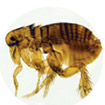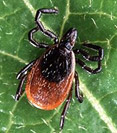Vaccinations
Keeping your pet up-to-date on their vaccines helps prevent serious contagious illnesses. We have a variety of vaccines available and will tailor your pet’s vaccine protocol based on the lifestyle they lead. And don’t forget, the law requires you keep up-to-date with your pet’s rabies vaccine! Rabies is a 100 % fatal disease which people can contract from wildlife or their pets. Thankfully, due to the push to have animals vaccinated, rabies has become a very rare disease in Canada.
Parasite Prevention
Fleas, mites, ticks, heart worm, intestinal worms: our pets are regularly exposed to parasites. Even cats living on the 12th floor of apartment buildings can get fleas! We have a variety of products for parasite control. If we have examined your pet in the last year you do not need an appointment to obtain most of our parasite control products. Just stop in or call us and we can help pick out the best product for you. We recommend heart worm prevention for our dogs as long as temperature is above 4C (the active time for Ticks). Don’t forget to have them tested first for heart worm in April or May!
How are intestinal parasites treated?
Different parasites require different medications, however the treatment is relatively easy to administer and affordable. In addition, some heartworm preventive medications also contain deworming ingredients used to treat and control some of the intestinal worms.
If your dog or cat has an intestinal parasite, it is important that you take the proper measures to prevent re-infection. Each dose of the de-worming medication must be given as instructed, and a stool sample should be provided a certain period after the de-worming to ensure that all parasites have been eliminated. The most common source of re-infection is the feces from your pet, which may contain infective eggs if it has been left in the environment for more than a few days. Pick up poop immediately after your pet has relieved itself and wash any contaminated bedding and litter boxes. Some sources also advocate more frequent bathing. Tapeworms are a special concern, since an intermediate host such as fleas or rodents may be present to continue on the infection. If this is the case, you will need to eliminate these creatures from the environment of your pet.
Common Parasites in Ontario:
Ticks are a common parasite that feed on dogs. Tick species are found worldwide and may infest dogs in very large numbers, especially during certain times of the year. These blood-sucking parasites are often found in tall grass, where they will attach themselves to a passing animal. Ticks require physical contact to infest your pet, and harpoon-like “teeth” allow them to anchor firmly in place while sucking blood from their animal host. Ticks also act as vectors of disease. Ticks can carry and spread the organisms that can cause Lyme disease, Rocky Mountain spotted fever, several types of ehrlichiosis, and other potentially deadly diseases. A single tick can carry several disease organisms at the same time.
Risk from biting ticks is increased if:
- Tick-borne diseases have been diagnosed in your region
- You and your pet spend time camping, hiking, or hunting in wooded or undeveloped areas.
- You have seen a tick, or previously removed one from your dog.
- Your dog is exposed to wildlife that are frequent tick hosts (deer, rodents, raccoons, etc.).
- Your yard has dense shrubs, tall grass, or leaf litter which serve as common tick habitats.
- You take your dog to wooded areas or grassy meadows.
- Your pet is not on a tick control product.
With the use of combination products, multiple parasites can be prevented with a single monthly dose. As part of your pet’s healthcare team, we would be glad to answer any questions that you have and to provide you with products and information about these products to promote a safe, happy and parasite-free relationship with your pet!







